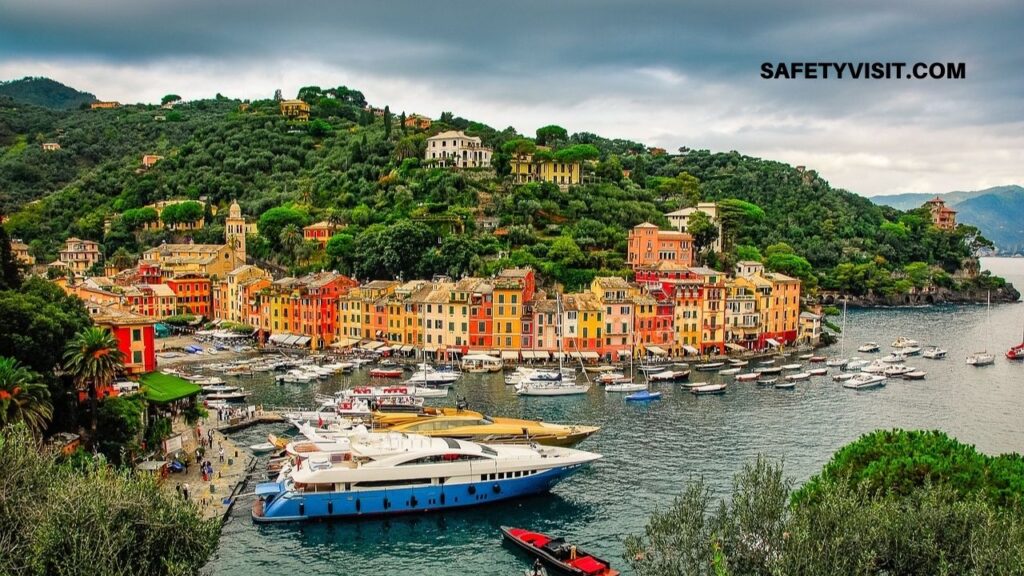Is Italy Safe For Black Travelers? Italy is generally safe for Black travelers, though experiences can vary by region. Many Black travelers report feeling secure overall.
Italy is a popular tourism destination because of its beautiful architecture, fascinating history, and internationally recognized food.
On the other hand, you might be wondering about the unique safety and cultural experiences that Black tourists might have in Italy.
Thankfully, Italy is a generally safe country, especially in larger cities where most Black travelers find the country to be welcoming.
Like any destination, though, you should be aware of the customs, potential obstacles, and strategies for navigating them.
We will discuss what Black tourists in Italy can anticipate in this guide, along with some helpful advice for a pleasurable trip.
Contents
Understanding Safety for Black Travelers in Italy
General Safety Overview
Italy is widely regarded as a safe travel destination, with relatively low rates of violent crime, especially in popular tourist destinations.
According to global safety indexes, the nation is well-ranked, and violent crimes such as homicide and assault are rare. [Is Italy Safe For Black Travelers?]
Pickpocketing and bag snatching, on the other hand, are more frequent small-time crimes, especially in popular tourist destinations like Rome, Venice, and Naples.
Major tourist destinations in Italy are proactively kept secure by the police and other authorities, so visitors typically feel safe there.
Traveling abroad can be made even more enjoyable by taking general safety precautions, like being aware of your surroundings and securing your belongings.
Cultural Attitudes and Perceptions
Even though the majority of Italians are hospitable and friendly, Black tourists may still run into some cultural differences, particularly in smaller towns or rural areas where diversity is less prevalent.
Although overt racism is uncommon, microaggressions like staring or slow service can happen in Italy given its complicated history with race. [Is Italy Safe For Black Travelers?]
Black travelers report feeling much more at ease in larger cities like Milan, Rome, and Florence, which are more accustomed to diversity. However, these incidents are usually not motivated by hostility but rather curiosity.
Experiences of Black Travelers in Italy
Positive Experiences in Major Cities
The majority of Black travelers to Italy report that their trips are enjoyable and culturally enriching; major cities in particular are renowned for their welcoming environments.
The sheer number of foreign visitors to cities like Rome and Florence fosters a lively, multicultural environment where people from all backgrounds are common.
Because of their large expat populations and cultural events, these cities facilitate easy social interaction and cultural immersion for visitors.
[Is Italy Safe For Black Travelers?] Black travelers frequently cite the amazing food, the friendliness of the Italian people, and the splendor of the historic sites as their favorite aspects of their travels.
Additionally, hotels, restaurants, and tourist destinations in Italy are used to hosting visitors from all over the world, demonstrating how accommodating the country’s hospitality sector is.
Challenges in Smaller Towns and Rural Areas
Smaller towns and rural locations, however, might offer a somewhat different experience.
There might not be as many Black locals or foreign visitors in these areas, which could cause odd looks or even inquiries about one’s background.
Even though these exchanges are frequently friendly, they can nevertheless be unsettling, especially if you are unprepared.
Black tourists have occasionally complained about receiving slower service or feeling like they are receiving different treatment in shops and restaurants. [Is Italy Safe For Black Travelers?]
Even though this can be discouraging, it is important to keep in mind that the majority of Italians are courteous and accepting. Reacting calmly and confidently to any awkward situations can help diffuse them and improve the overall experience.

Tips for Black Travelers Visiting Italy
Cultural Etiquette
Being aware of a few of the deeply ingrained cultural norms and values of Italy will make your travels more comfortable.
- Dress Modestly: Italians are known for their stylish yet modest attire, which is especially appropriate in places of worship or historical significance. If you want to blend in and avoid drawing too much attention, you should wear neutral or classic styles. It is also a good idea for women to steer clear of clothing that is too revealing because this is in line with the conservative dress code that is prevalent in smaller towns.
- Learn Some Basic Italian Phrases: Although many Italians speak English, particularly in tourist-heavy areas, it is always appreciated to make an effort to speak Italian. A few basic phrases like “Per favore” (please), “Buongiorno” (good morning), and “Grazie” (thank you) can go a long way in demonstrating respect for Italian culture and building rapport.
Safety Practices
Although Italy is a generally safe place to travel, you should always take the following precautions to make sure you are comfortable and safe:
- Watch Out for Pickpockets: Italy’s well-known tourist destinations are a magnet for small-time thieves, especially in crowded areas like the Grand Canal in Venice or Rome’s Trevi Fountain. Do not leave valuables in plain sight or hang your bags on chair backs.
- Choose Reputable Accommodations: If you are traveling to a major city, try to stay in one of the many well-regarded hotels or vacation rentals; many of them offer safe storage for valuables, so you can relax while you are out and about. [Is Italy Safe For Black Travelers?]
- Keep Yourself Aware When Using Public Transportation: Although Italy’s transportation system is excellent, pickpocketing is a common occurrence, especially on crowded buses or trains. Keep your belongings safe and think about using a money belt or cross-body bag.
Navigating Racial Differences
Knowing how to deal with cultural differences as a Black traveler can improve your trip and enable you to form deep connections:
- Handle Microaggressions with Grace: Most people will respond favorably to a polite conversation and will make an effort to accommodate your needs. If you encounter a microaggression, such as a curious stare or slow service, take a moment to evaluate the situation before reacting.
- Interact with Local Communities: There are many different types of expat communities in Italy’s major cities, including Black-specific groups. These communities can be a great source of information, social events, and advice. By getting involved with these groups, you can increase the enjoyment of your trip and have a network of support while you are on the road.
Popular Destinations and Safety Notes
Cities like Rome, Florence, and Milan
Rome, Florence, and Milan—three of Italy’s most well-known cities—are among the friendliest and safest for Black tourists.
These cities draw tourists from all over the world with their vibrant cultural scenes, world-class museums, and rich histories.
These places are less likely to give you the curious looks that you might get in more rural areas. [Is Italy Safe For Black Travelers?]
Rome has a cosmopolitan vibe, welcomes millions of tourists annually, and is well-known for its historical landmarks like the Colosseum and Vatican City.
The Renaissance’s center, Florence, is a treasure trove of artwork and architectural design, while Milan—the country’s center of fashion—offers a contemporary urban atmosphere.
These cities are used to a wide range of tourists, and the people who live there are usually welcoming and accommodating.
Smaller Towns and Rural Areas
Traveling to Italy’s smaller towns can be very rewarding because they provide interesting perspectives on the country’s customs and culture.
But they might also be less varied, which might cause curious looks or questions from time to time. [Is Italy Safe For Black Travelers?]
Accept these encounters as chances for cross-cultural learning, and be ready to respond to inquiries about your history.
These trips can be made more meaningful and enriching by dressing according to local traditions and keeping an open mind.
Embracing Italy’s Culture as a Black Traveler
Italy’s deep cultural roots are just as appealing as its breathtaking landscapes and historical landmarks. Here are some tips to fully experience the Italian way of life while visiting:
- Participate in Local Events: Italy is home to numerous cultural festivals, such as the Palio horse race in Siena and the Venice Carnival. By going to these events, you can gain a deeper understanding of Italian customs and form meaningful connections with locals.
- Savor Italian Cuisine: While Italian food is well-known throughout the world, experiencing it in Italy is like no other. From pizzas and pastas to regional specialties, embracing the local cuisine is a crucial component of the country’s overall experience.
- See Famous Landmarks and Undiscovered Treasures: Italy is home to many famous landmarks, like Pompeii and the Leaning Tower of Pisa. But, you should also think about visiting lesser-known locations, like little coastal towns or mountain villages, where you can take in the country’s stunning scenery and rich history away from the hordes of tourists.
Final Thoughts
From the vibrant markets of Rome to the art-filled streets of Florence, Italy has much to offer Black tourists. [Is Italy Safe For Black Travelers?]
Even though there might be some small cultural differences, the nation’s allure, friendly people, and breathtaking landscapes greatly exceed any difficulties.
You can immerse yourself in Italy’s vibrant culture and make lifelong memories by keeping informed, honoring local customs, and following standard safety precautions.
See Also: Is Portugal Safe For Black Travelers?
FAQs
Are certain areas in Italy safer for Black travelers than others?
Smaller towns are safe, but might not be as diverse, so you might get strange looks in larger cities like Rome, Milan, and Florence. Larger cities like these tend to be more accepting and used to diverse populations.
What should I do if I experience racism in Italy?
Remain composed and respond courteously in the event that you come across discrimination; most Italians are courteous and will react favorably to candid communication.
Is it safe to use public transportation in Italy?
Yes, traveling by public transit in Italy is generally safe, but be cautious and keep your belongings close if you plan to visit crowded areas as pickpocketing can occur there. [Is Italy Safe For Black Travelers?]
How can I connect with other Black travelers in Italy?
Join travel forums or look for expat groups on social media; many cities have vibrant Black traveler communities that provide suggestions for events, support, and advice.
What Italian phrases should I know before visiting?
Acquiring fundamental expressions such as “Buongiorno” (Good morning), “Grazie” (Thank you), and “Per favore” (Please) can facilitate day-to-day conversations and demonstrate consideration for Italian customs.
Conclusion: Is Italy Safe For Black Travelers?
Italy offers Black travelers a memorable and generally positive experience if they take the time to plan, embrace the country’s beauty and rich culture, and connect with local communities. This is especially true in cosmopolitan cities like Rome, Florence, and Milan.
Even though you may occasionally run into curious looks or slight cultural differences, Italy is a worthwhile trip because of its dynamic culture, friendly people, and top-notch attractions.
You can have a safe and culturally enriching trip by dressing modestly, learning a few basic phrases in Italian, being alert in crowded areas, and interacting with local communities.
You will leave Italy with priceless experiences and memories if you embrace its warm history. [Is Italy Safe For Black Travelers?]

